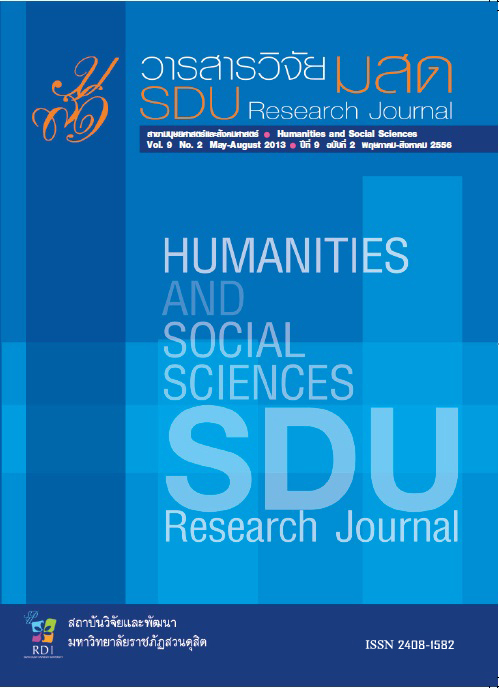การพัฒนาระบบการประเมินนักศึกษาสหกิจศึกษาตามแนวคิดการประเมินแบบร่วมมือรวมพลัง
Keywords:
สหกิจศึกษา, การประเมินแบบร่วมมือรวมพลังAbstract
บทคัดย่อ
การวิจัยครั้งนี้ มีวัตถุประสงค์เพื่อพัฒนาระบบ ทดลองใช้ระบบและประเมินคุณภาพของระบบการประเมินนักศึกษาสหกิจศึกษาตามแนวคิดการประเมินแบบร่วมมือรวมพลัง กลุ่มตัวอย่างที่ใช้ในการวิจัยมี 4 กลุ่มในสาขาวิชาชีววิทยาและสาขาวิชาการโรงแรม มหาวิทยาลัยเทคโนโลยีราชมงคลธัญบุรี ประกอบด้วย อาจารย์นิเทศจำนวน 13 คน พี่เลี้ยงนักศึกษาจำนวน 16 คน เพื่อนร่วมงานของนักศึกษาจำนวน 20 คนและนักศึกษาสหกิจศึกษาจำนวน 53 คนเครื่องมือที่ใช้ในการทดลองได้แก่ คู่มือการใช้ระบบและแบบประเมินนักศึกษาสหกิจศึกษา และเครื่องมือในการเก็บรวบรวมข้อมูลได้แก่ แบบสัมภาษณ์ไม่มีโครงสร้าง แบบสอบถามและแบบประเมินนักศึกษาสหกิจศึกษา วิเคราะห์ข้อมูลด้วย ความถี่ ร้อยละ ค่าเฉลี่ย ส่วนเบี่ยงเบนมาตรฐาน ค่าดัชนีความสอดคล้องของผู้ประเมิน (RAI) และการวิเคราะห์ GENOVA ส่วนข้อมูลเชิงคุณภาพใช้การวิเคราะห์เนื้อหา ผลการวิจัยพบว่า 1) ระบบการประเมินนักศึกษาสหกิจศึกษาตามแนวคิดการประเมินแบบร่วมมือรวมพลังประกอบด้วย 4 องค์ประกอบได้แก่ ระบบการวางแผนร่วมกัน ระบบฐานข้อมูล ระบบปฏิบัติการประเมิน และระบบการให้ข้อมูลป้อนกลับ 2) องค์ประกอบและตัวบ่งชี้ในการประเมินนักศึกษาสหกิจศึกษาตามแนวคิดการประเมินแบบร่วมมือรวมพลัง ประกอบด้วยคุณลักษณะทั่วไปจำนวน 23 ตัวบ่งชี้ คุณลักษณะด้านวิชาชีพการโรงแรม มี 54 ตัวชี้วัดและวิชาชีพชีววิทยามี 7 ตัวชี้วัด 3) การประเมินระบบหลังทดลองใช้พบว่ามีความเป็นมาตรฐานทั้ง 4 ด้านคือ ด้านการใช้ประโยชน์ ด้านความเป็นไปได้ ด้านความเหมาะสม และด้านความถูกต้องอยู่ในระดับมากทุกด้าน 4) ค่าดัชนีความสอดคล้องกันของผู้ประเมิน (RAI) มีค่าตั้งแต่ 0.83ถึง 1 ค่าสัมประสิทธิ์การสรุปอ้างอิง (G-coefficient) การประเมินนักศึกษาสหกิจศึกษาของผู้ประเมิน 4 คนในการประเมิน 4 ครั้งมีค่าความแปรปรวนของปฏิสัมพันธ์ระหว่างนักศึกษา ครั้งในการประเมินและจำนวนผู้ประเมิน (POR)สาขาวิชาชีววิทยามีค่าสูงสุดเท่ากับ 0.87 และสาขาวิชาการโรงแรมมีค่า 0.90 แสดงว่าความแตกต่างของคะแนนเนื่องมาจากความสามารถของนักศึกษาแต่ละคน 5)การศึกษาเพื่อการตัดสินใจการสรุปอ้างอิง (D - STUDY)
การสรุปอ้างอิงผลการประเมินของนักศึกษา เมื่อกำหนดค่าสัมประสิทธิ์การสรุปอ้างอิง 0.70 ขึ้นไปพบว่า สาขาวิชาชีววิทยาควรมีรูปแบบการประเมิน 2 ครั้งโดยใช้ผู้ประเมิน 4 คนส่วนสาขาวิชาการโรงแรมควรมีรูปแบบการประเมิน 3 ครั้งโดยใช้ผู้ประเมิน 2 คน
คำสำคัญ: สหกิจศึกษา การประเมินแบบร่วมมือรวมพลัง
Abstract
The major objective of this research study was to develop an evaluation system for students participating in cooperative education. The developed evaluation system was based on a collaborative evaluation approach. This comprised of: 1) system development, 2) testing the developed system, and 3) evaluation of the developed system. The participants were: 1) 13 supervising teachers, 2) 16 mentors of cooperative students, 3) 20 colleagues of cooperative students, and 4) 53 cooperative students majoring in Biology and Hotel at Rajamangala University of Technology Thanyaburi. Research tools were a system handbook and an evaluation form for cooperative students. Data collection was gained from an unstructured interview, a questionnaire, and the evaluation form for cooperative students. Data analysis employed frequency, percentage, mean, standard deviation, and RAI (Rater Agreement Index), including GENOVA (Generalized Analysis of Variance). Content analysis was used for qualitative data.
The findings were as follows: 1) the development of the evaluation system for cooperative students based on the collaborative evaluation approach consisted of 4 components including interaction building, data base system, action evaluation system, and feedback; 2) there were 23 general characteristics indicators, 54 specified indicators for the Hotel group, and 7 specified indicator for the Biology group; 3) the post try-out evaluation system showed high levels regarding the 4 components, including utility, feasibility, propriety, and accuracy; 3) the results of RAI analysis showed IOC between 0.83 and 1.00 for both Hotel and Biology groups, whereas the G-coefficient was 0.87 maximum for Biology students when evaluated by 4 evaluators on 4 occasions, and 0.90 with the Hotel group, concerning students abilities; and finally 5) the generalization of the Decision study (D-STUDY) indicated that the G-coefficient at 0.70 could apply for the Biology students with 2-time rating with 4 evaluators, whereas 2 evaluators with 3- time rating could be applied for the Hotel students.
Keywords: cooperative education, collaborative evaluation








